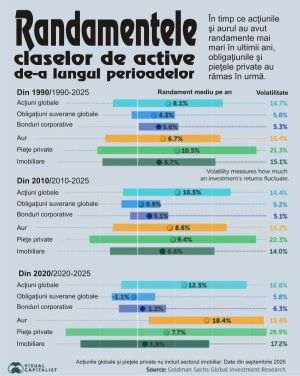Regardless of which candidate wins the US presidential election, capital markets are unlikely to be heavily influenced in the short term, but later, when the winner's policies are implemented, the impact may be more significant, it said in a report of the Analysis Department of the Prime Transaction brokerage company, signed by Marius Pandele.
"If in 2016 a victory of the Republican Donald Trump in the presidential elections, improbable at the time, it seemed that it would deal a heavy blow to the shares listed in the United States and, by contagion, to the international ones, the reality was completely different, and the market reaction was favorable. Subsequently, Trump proved to be a president very interested in the evolution of stock indexes, taking several measures to try to stimulate their growth and even pressuring the Federal Reserve to keep interest rates low, although he had no monetary policy duties . In 2020, Joe Biden was first seen as an adversary to the capital markets, then he began to be digested more easily, and finally the indices found their upward direction," the report said.
According to Prime, between the time of the election four years ago and the end of last month, the S&P 500 Index was up 65.5%, or 13.42% annualized, a performance very close to that recorded between November 2016 and November 2020, i.e. the period between the election that brought Donald Trump to power and the one in which he lost his seat in the White House, when the index gained 62.14%.
"The fact that Donald Trump and Joe Biden ultimately had terms in office where the stock market went at a similar rate (if we extend the period back one more term, Barack Obama's second term, also calculated from November to November, brought about a 56% increase in the S&P 500 index, so still close to the figures above) suggests that the US elections have, in reality, a much smaller impact on capital markets than it seems at first glance. In the mandate of Donald Trump, the COVID pandemic brought significant drops in quotations, while in the mandate of Joe Biden, the place of the pandemic was taken by the war in Ukraine and the increase in the inflation rate, but each time the shares recovered and brought returns above historical averages", the material states.
According to those at Prime, at the moment the highest probability is that Donald Trump will return to the White House, but there may be surprises. "The result will depend on the ability of his opponent, Kamala Harris, to mobilize his electorate, or rather, to mobilize the anti-Trump electorate, in key states. In the case of the former businessman, the hard core is always active and disciplined, so there is neither great improvement nor dramatic decline. In the case of the Democrats, the electoral base is larger, but more fragmented, there are often categories of voters who do not feel represented by the party's candidate and prefer not to vote, as happened in 2016", according to the report.
In the Prime analyst's opinion, if in the case of Harris we can expect a continuation of the center-left policies of the current president, perhaps with a slightly greater tendency to the left, but without reaching close to an extreme, Trump is, as well as in the past, unpredictable. He is expected to push again for tax and interest cuts, but he may also take actions that directly or indirectly harm financial markets, such as the trade wars he has initiated against China and the European Union," the report said.
According to the analyst, the biggest question mark related to the impact of Trump's return to the White House on the capital market has nothing to do with the economy, but with his attitude towards the military conflicts that exist at this moment in the world or are foreshadowing.
"If regarding the Middle East and Taiwan it is expected to continue the current policy of the United States, regarding Ukraine nothing can be anticipated, and a possible change of direction could destabilize the whole of Europe. The past shows that the tough talk of the former (and possibly future) US president is not always followed by action, and Congress has an important say in turn, but overall it is clear that the risk of seeing defeat of Ukraine and possibly a Russian attack on another European country would be greater with him in power than with Kamala Harris. In such a situation, the capital markets will most likely also suffer, no matter how many tax or interest reductions appear in the USA", the document signed by Marius Pandele states.










































